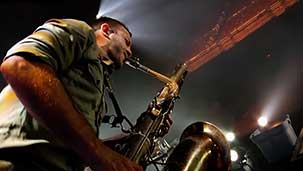A documentary like The Devil’s Horn lives or dies by the quality—and sometimes bizarreness—of its revelations. That this film is engaging as it is has a great deal to do with the sheer amount of strange and often tragic history you managed to unearth about something as seemingly mundane as the Saxophone.
The Devil’s Horn is a reference to the notorious behavior that this instrument ostensibly inspires. A particular favorite in Jazz circles, its range and emotional power were seen as almost magical and created an enormous stir within the European musical community when first introduced in the mid-19th century. Disruptive enough that the inventor, a talented but ultimately ill-fated Belgian named Adolphe Sax was the target of failed assassinations, malignant and ill-founded lawsuits, and general character smearing at the hands of many of Europe’s instrument manufactures.
The film sometimes suffers from hyperbolic graphics but is otherwise thoroughly engaging. Part origin story, part contemporary history, the range of talented people who have made the saxophone their own is endlessly fascinating. From a Turkish/Bulgarian/Roma cab driver that plays a kind of speed metal wedding music, to a slightly new age-y gentleman who has taught himself to sustain notes for minutes at a time, to two brothers who have been playing Jazz for close to seventy years together, there is no shortage of compelling characters populating this film.
The Devil’s Horn is most effective when it simply allows these eclectic and wildly talented musicians to tell their stories. Combined with Adolphe Sax’s lamentable and too-bizarre-for-fiction-history The Devil’s Horn is pretty goddamn entertaining while somehow underscoring the often-tragic consequences that befall anyone foolish enough to take up this particular instrument.
From Adolphe Sax to Charlie Parker and many in between, there has been no shortage of ill-fated sax players and these tragedies lend some weight to the film’s title. One of the most fascinating stories is a former Gospel sax player turned preacher who leads his congregation in rousing sermons, often culminating in a laying on of hands while still playing one handed: men and women speaking in tongues, collapsing in heaps and covered in sheets to preserve their modesty, while crying and wailing incoherently—a sermon with all the trappings of a concert gone very wrong. All the while the Reverend continues to blow.
The highest praise I can give a documentary is how eager I was after watching it to follow up on the various threads it unspooled. I now have incorporated Bulgarian Sax into my iPod and know far more than I ever imagined I would about the terrible life and sad death of a singular Belgian inventor. So much of that speaks to the work you did on this pretty surprising film, and for that I thank you.
Sincerely,

Tim







